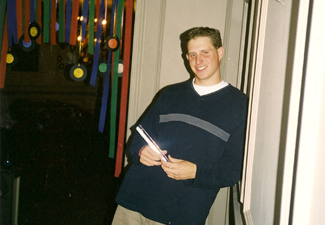Evan
A Meningitis Story
There’s a saying that “what you don’t know won’t hurt you.” It’s not true. What I didn’t know hurt me. It cost me the life of my son.
Evan’s story as told by his mother Lynn.
Our story began March 25, 1998. It is a day that my husband and I will never forget. It was a day marked by events that have left a permanent hole in our hearts. It was the day our son, Evan, called from college to tell us that he had a migraine headache.
Evan was 20 years old, a college junior and honor student, and a pitcher on his college baseball team at Georgia Southwestern University.

Worse than a migraine.
He complained of a horrible headache, the worst headache he’d ever had, and was nauseated. He said he couldn’t hold anything down. He said that the light in his dorm room hurt his eyes. Evan had never had a migraine before, but migraines do run in the family, so we weren’t overly alarmed.
By dinnertime, Evan was still feeling awful. We told him to get one of his friends to take him to the emergency room. We thought that at least he could get something for his nausea.
During the next few hours, we talked to his baseball coach, who had gone to see Evan at the hospital, and the ER physician, who told us that Evan had a little virus. The hospital had decided to keep Evan overnight so that he could have a quiet night to get more rest.
The next morning, I called Evan about 7 AM. The nurse answered, and said that Evan felt too sick to talk to me. I asked her to put the phone up to his ear. I asked him if he wanted us to pick him up and take him home for the weekend. He said he did.
Evan was on spring break, but really didn’t get much of a chance to have one because his baseball team had games scheduled during that time. We figured he must be tired, and a weekend home with us where he could rest and eat good food was what he needed.
My husband and I were making arrangements to meet back at our house when I received a phone call just after arriving at work. I was told that Evan had meningococcal meningitis and was in critical condition.
When you get a phone call like this, your mind can’t even absorb what you’re being told. I knew so little about meningitis, that when the doctor said that it was bacterial, I thought that was the better type to have. I thought, well, at least there were antibiotics.
I didn’t realize that bacterial meningitis, especially the meningococcal meningitis that Evan had, was much more deadly. My husband and I drove the 3 hours to Evan, not knowing if he would be alive when we got there. We stopped mid way to call the hospital to check his condition. At that time, we didn’t have a cell phone to keep in constant contact with the hospital.
When we got to the hospital, administrators were waiting to talk to us. They wanted to prepare us for the way Evan looked and the criticality of his condition before we were allowed to see him.

That frightened us even more. Evan was in quarantine and was receiving oxygen with very labored breathing.
He was covered with the telltale purple rash. He could barely speak; he was so tired. He told us that it took every ounce of energy he had just to roll over.
We were told that the next 24 hours were critical.
My husband and I started the countdown. One hour down, 23 more to go. Calling our relatives to let them know what was going on. Trying to reach our younger son, Ryan, who was on spring break with friends in Panama City, Florida.
After a few hours, the doctors decided to transfer him to a larger hospital about 40 miles away, better equipped to handle bacterial meningitis. As he was taken to the ambulance, I said, “Love you, Evan.” As weak and sick as he was, he said, “Love you, Mom.” Those were the last words he said to us.
When Evan arrived at the hospital in Albany, Georgia, he was put on a ventilator and put into a drug-induced coma. It wasn’t long before his kidneys shut down, then his liver and lungs, and eventually affecting all of his organs. His fingers, his toes, his ears, his nose, all turning black. Then his entire hands were black; then his entire feet; and the gangrene kept spreading up his limbs.
We watched our son fight to breathe, fight to live.
After two more weeks, Evan was transferred to a third hospital, which had a burn unit. The damage to Evan’s organs from the meningococcemia was similar to the damage that burn victims suffer. One day later, Evan’s arms were amputated above the elbows and his legs above the knees. We had to sign consent forms allowing the doctors to amputate as much as was necessary to save his life. We had no choice; we would do anything to save Evan.
Several days later, Evan suffered 10 hours of grand mal seizures. The seizures caused irreversible brain swelling. Evan was brain-dead. This son of ours, loved more than we can put into words, had to be disconnected from the machines that were keeping him alive…had to be put into a body bag in front of our eyes.
After Evan died, we found out to our astonishment that a vaccine was available, a vaccine that would have saved Evan’s life. Not a new vaccine, but one used very successfully and safely by the military to control meningitis outbreaks for over 30 years. The vaccine protected against four of the five strains of meningococcal meningitis. If we had known about this vaccine, Evan would have received it and Evan would be here today.
It was about that time that researchers recognized a link between college students and meningitis. The previous fall, the American College Health Association had sent out an alert to its member institutions, saying that college students were at increased risk of contracting meningococcal disease. Unfortunately, this information didn’t reach my son’s school in time.
No family should lose a child.
No family should lose a child to a vaccine-preventable disease. My husband and I had given Evan every vaccine that was recommended before he started college. No one told us about meningitis. Had we known that a vaccine even existed, whether it was recommended or not, Evan would have received it.
We felt that if we didn’t know about this, that there were other families that didn’t know either. That’s why we started doing outreach. It was a way to honor our son’s memory and prevent tragedies from happening to other families. We started the National Meningitis Association with four other families. We all shared similar stories – we didn’t know meningococcal meningitis was potentially vaccine-preventable.
BECOME A VACCINE ADVOCATE
There are lots of ways you can make a difference in your community.

